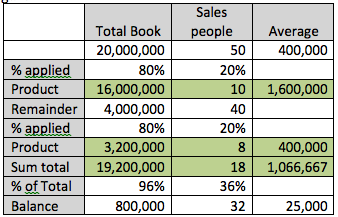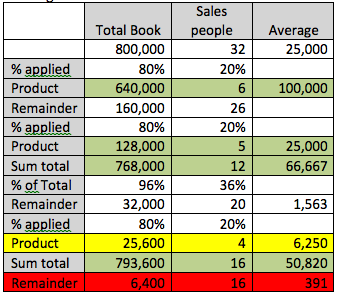
5 Things to Do to Own a Sales Team Built for Growth
I’m working on an article discussing the 80/20 Power Curve. It’s the concept Perry Marshall discusses in his book: The 80/20 of Sales and Marketing. Normally, I focus on the top part of the curve. The part of the curve that represents about 95% of all the production generated by a sales team (See Figure 1 below)
If you look at your total sales results, you would find something close to the following:
Figure1

Last week, I presented to a group of CEOs at the BISA CEO Summit held at Vanderbilt University. This slide alone raised a few eyebrows and caused some thinking about the relevance, importance and cost of the 64% of the sales team only representing 4% of the results. (32 sales people responsible for 800,000 of the 20,000,000 in revenue.) What alarmed me was the bottom part of the 80/20 power curve. What does the bottom look like? (See Figure 2)
Figure 2

Trust my excel spreadsheet. The numbers add up and they don’t lie. They may not represent your team exactly, especially if your team has less than 10 sales people, BUT do the math and you will arrive at a similar finding. Figure 2 is telling the president of the company that of the 50 sales people in his company, the bottom 20 (40%) Represent 32,000 of a 20,000,000 book of business (.0016%).
Regardless of how you dissect it, spin it, negotiate it or defend it, this cannot be what you expected when you hired these 20 people.
So, what do you do? Here are the 5 THINGS:
- Start with your sales manager. This is the person responsible for sales, productivity, and sales effectiveness. If ROI is one of the metrics you use to determine success, how would you evaluate the ROI on the bottom 20% of the sales team?
- Next, I would look at the recruiting practices. As difficult as this might be, you have to answer the question about under performers – Did you hire them this way?
- You will also want to look at the on-boarding and the development plan in place that should be there to improve the probability of success. As above, you have to answer the question – Did you make them this way? If you didn’t hire them this way – already failures – then you’ve made them this way – turned them into failures.
* I anticipate you might say – “I didn’t hire them, I inherited the team.” Like it or not, after a year, they are yours!
- Look at your systems and processes to make sure they are designed, implemented and executed to support successful sales growth.
- Look at your sales system and evaluate how well it is being executed top to bottom. My guess is that your best people execute a sales process and they execute it consistently.
Additional resources:

